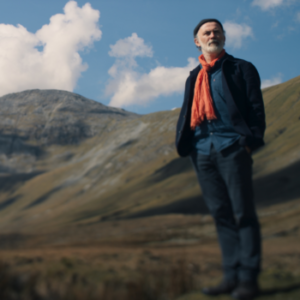Tommy Tiernan tells the story of the West of Ireland through the rich body of culture it has inspired in this two-part series. In a place he calls home, Tommy travels one of the world's most evocative coastlines, bringing us a visual feast and fitting tribute to the immense beauty, rich heritage and unique spirit of the West of Ireland.

From the soaring heights of Skellig Michael to Tuam's abandoned train station, from the rocky silence of the Burren to the electronic world of a Galway nightclub, Tommy's guides are the art, literature, plays, poems and films created in the West and about the West.
Along the way he meets creative giants like Kevin Barry, Garry Hynes, Blindboy Boatclub, Mairéad Ní Mhaonaigh and explores with a fresh eye the works of the Blasket Islanders, writings of Tim Robinson and John Moriarty and the captivating works of Dorothy Cross.
At times humorous and touching, this two part series is an exploration of the West's epic crooked landscapes and the creativity they provoked. From romantic myths to harsh realities, 'Tommy Tiernan's Epic West' is a ramble through the Irish imagination in all its awkward contradictions.
Watch Episode 1 on the RTÉ Player HERE
Tommy Tiernan travels from Skellig Michael through Sligo and Connemara to meet Kevin Barry, The Saw Doctors and Garry Hynes and explore the unique cultural identity of the West of Ireland.
Watch Episode 2 on the RTÉ Player HERE
Tommy Tiernan continues his travels along the western coast to explore the works of artists living and creating in the west today. He meets Blindboy Boatclub, Galwegian DJ Shampain and poet Mary O'Malley and looks at depictions of the West in films, artworks and music.
I left Luuq, a town in Gedo region in southern Somalia, at noon. Twenty-four hours later I was on the M50 in Dublin. I’m not sure how many thousands of miles I travelled but I do know the length of time it took me to do it. A day. Everything that I saw is just a day away.
I was in a hospital and I saw a woman come in and lay her baby on a bed. A doctor came over and we were asked to leave. Word came through later on that the child had died. From hunger.
We were taken to an area outside the town where tens of thousands of people were camped. Their crops had failed and their animals had died so they’d walked for days to get here. A man I was talking to had buried one of his kids by the side of the road during the journey knowing that if they’d stopped to grieve properly more of his children would die. Digging a hole into the dirt with his bare hands. His family watching. The child wrapped in a cloth. Two of his other small children on the verge of severe malnutrition. His wife unable to breastfeed them because her milk has dried up.
An old man said to me: “It has never been as bad as this. All I do is think of the past.” I asked him did he blame anyone and he said: ‘No, it is God’s will and only God can save us.’”
I passed the entrance of a tent and a baby lying on the ground looked like the one I’d seen in the hospital earlier that day. He was lying in the shade with his mother, on the edge of death. A victim of logistics.
Hundreds of thousands of children may die before the year is out and they will all be victims of logistics. There is food, there just isn’t the global will to get it to them. Governments have other priorities.
The Irish Emergency Alliance, which includes Trócaire, has launched an appeal for the Horn of Africa. Donations to this urgent appeal can be made through IrishEmergencyAlliance.org or by calling 1800 939 979
